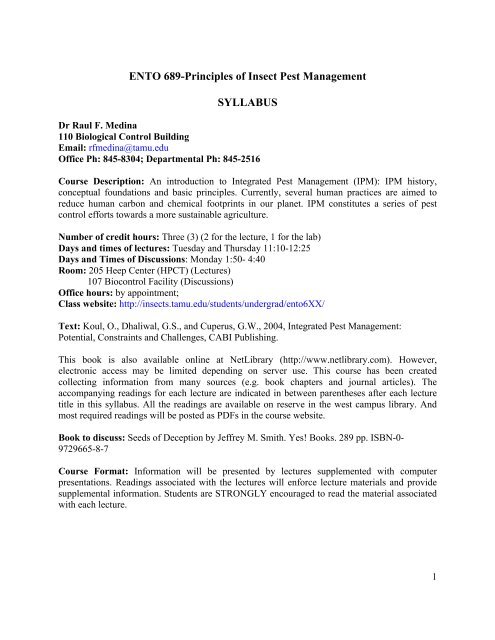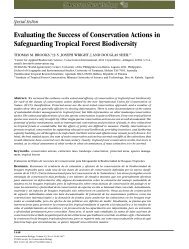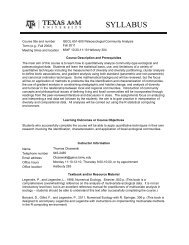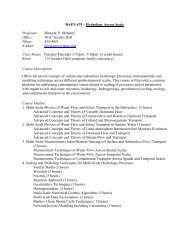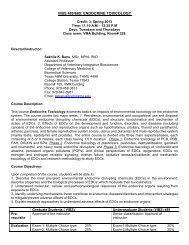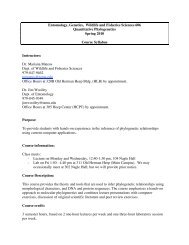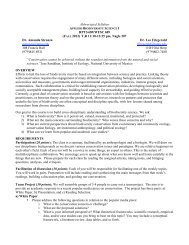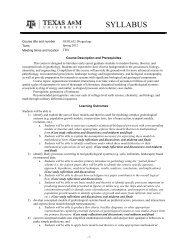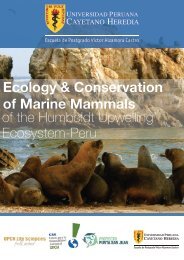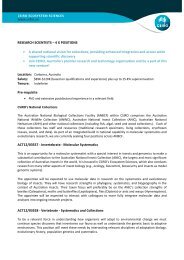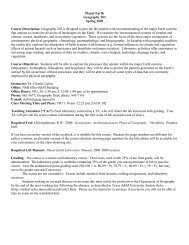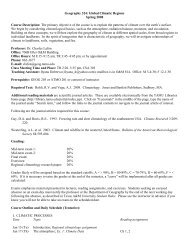ENTO 689-Principles of Insect Pest Management SYLLABUS
ENTO 689-Principles of Insect Pest Management SYLLABUS
ENTO 689-Principles of Insect Pest Management SYLLABUS
You also want an ePaper? Increase the reach of your titles
YUMPU automatically turns print PDFs into web optimized ePapers that Google loves.
<strong>ENTO</strong> <strong>689</strong>-<strong>Principles</strong> <strong>of</strong> <strong>Insect</strong> <strong>Pest</strong> <strong>Management</strong><br />
<strong>SYLLABUS</strong><br />
Dr Raul F. Medina<br />
110 Biological Control Building<br />
Email: rfmedina@tamu.edu<br />
Office Ph: 845-8304; Departmental Ph: 845-2516<br />
Course Description: An introduction to Integrated <strong>Pest</strong> <strong>Management</strong> (IPM): IPM history,<br />
conceptual foundations and basic principles. Currently, several human practices are aimed to<br />
reduce human carbon and chemical footprints in our planet. IPM constitutes a series <strong>of</strong> pest<br />
control efforts towards a more sustainable agriculture.<br />
Number <strong>of</strong> credit hours: Three (3) (2 for the lecture, 1 for the lab)<br />
Days and times <strong>of</strong> lectures: Tuesday and Thursday 11:10-12:25<br />
Days and Times <strong>of</strong> Discussions: Monday 1:50- 4:40<br />
Room: 205 Heep Center (HPCT) (Lectures)<br />
107 Biocontrol Facility (Discussions)<br />
Office hours: by appointment;<br />
Class website: http://insects.tamu.edu/students/undergrad/ento6XX/<br />
Text: Koul, O., Dhaliwal, G.S., and Cuperus, G.W., 2004, Integrated <strong>Pest</strong> <strong>Management</strong>:<br />
Potential, Constraints and Challenges, CABI Publishing.<br />
This book is also available online at NetLibrary (http://www.netlibrary.com). However,<br />
electronic access may be limited depending on server use. This course has been created<br />
collecting information from many sources (e.g. book chapters and journal articles). The<br />
accompanying readings for each lecture are indicated in between parentheses after each lecture<br />
title in this syllabus. All the readings are available on reserve in the west campus library. And<br />
most required readings will be posted as PDFs in the course website.<br />
Book to discuss: Seeds <strong>of</strong> Deception by Jeffrey M. Smith. Yes! Books. 289 pp. ISBN-0-<br />
9729665-8-7<br />
Course Format: Information will be presented by lectures supplemented with computer<br />
presentations. Readings associated with the lectures will enforce lecture materials and provide<br />
supplemental information. Students are STRONGLY encouraged to read the material associated<br />
with each lecture.<br />
1
Course Rationale: As concerns about environmental safety increase worldwide, ways to control<br />
agricultural pests with the least possible environmental impact are actively being pursued.<br />
Integrated <strong>Pest</strong> <strong>Management</strong> (IPM) is a relatively new practice that combines an array <strong>of</strong><br />
strategies to combat pests in an effective yet environmentally friendly manner. The present<br />
course will define IPM and its main components and discuss the ecological underpinnings<br />
behind it.<br />
Course Objective and Learning Outcomes:<br />
The main goal <strong>of</strong> this course is that students understand how sound IPM practices rely on an<br />
understanding <strong>of</strong> ecological interactions among crops, pests and their natural enemies and to<br />
breach the illusionary gap between applied and basic research.<br />
After taking this course, students are expected to:<br />
- Identify gaps in IPM knowledge so they can pinpoint needed research venues<br />
- Recognize appropriate stakeholders or groups <strong>of</strong> interest for a particular pest problem<br />
- Define groups <strong>of</strong> interest affected by different IPM strategies.<br />
- Explain the ecological and evolutionary principles that make sound IPM strategies work<br />
Teaching Assessment:<br />
We will assess the fulfillment <strong>of</strong> the course goals and learning outcomes by using exams,<br />
quizzes, a written assignment (i.e., a book review), a debate and a 10-minute oral presentation. In<br />
addition, graduate students are asked to act as judges <strong>of</strong> undergraduate 10-minute oral<br />
presentations in a panel and are asked to provide a written report to each undergraduate student.<br />
Graduate students taken this class are asked to give a 10-minute presentation about what they<br />
consider a novel aspect <strong>of</strong> IPM or about their own research (if it has a connection with IPM) at<br />
the beginning <strong>of</strong> a lab session <strong>of</strong> their choice.<br />
Participation in classroom and laboratory discussions is strongly encouraged – students will<br />
occasionally be called upon in class and asked to work together in groups.<br />
Discussion Sessions<br />
This course is complemented by a discussion session in which current topics in IPM are<br />
addressed. The discussion sessions use a book review format as an excuse to address issued in<br />
IPM. Books are picked to motivate discussion on controversial issues so students can explored<br />
the complexities associated with each <strong>of</strong> the views discussed. In the past we have use Rachel<br />
Carson’s book “Silent Spring” and Jeffrey Smith’s book “Seed <strong>of</strong> Deception” to discuss different<br />
topics in IPM. Every semester a different book is discussed.<br />
2
Grading:<br />
A = 315 – 350 points<br />
B = 280 – 314 points<br />
C = 245 – 279 points<br />
D = 210 – 244 points<br />
F = 0 – 209 points<br />
Lecture = 70% <strong>of</strong> total grade (245)<br />
Exam 1 = 60 points<br />
Exam 2 = 60 points<br />
Exam 3 = 60 points<br />
Exam 4 = 60 points<br />
Participation = 5 Points<br />
Discussion = 30% <strong>of</strong> total grade (105)<br />
Book Review = 40 points<br />
Oral Presentation = 20 points<br />
Evaluator Skills = 15 points<br />
Participation = 30 points<br />
Attendance: Since my lectures are based on several sources, in order to succeed in this class it is<br />
strongly recommended you attend all lectures and discussions.<br />
Lecture Exams: Exam dates are annotated on the syllabus. Please note there is no exam during<br />
finals week.<br />
Book Review (graduate students only): A relevant book related to IPM is discussed each<br />
semester. Discussion sessions are schedule throughout the semester to explore and contrast the<br />
views in the book with student’s positions on selected topics (see course content below).<br />
Graduate students are asked to write a book review paper explaining why the book read is<br />
important (or not) and which aspects <strong>of</strong> IPM practices have positively or negatively been<br />
influenced by the ideas exposed in the book.<br />
Make-up Exams and quizzes: Make-up exams and quizzes will only be given for valid excuses.<br />
Missing exams or quizzes without valid excuses will be graded as zeroes. Excused absentees<br />
should be accompanied with a doctor note or any document that could attest the validity <strong>of</strong> your<br />
excuse. Religious holiday absentees or any other kind <strong>of</strong> conflicting commitment should be<br />
notified to me at least a week in advance.<br />
3
Americans with Disabilities Act (ADA) Policy Statement: The Americans with Disabilities<br />
Act (ADA) is a federal anti-discrimination statute that provides comprehensive civil rights<br />
protection for persons with disabilities. Among other things, this legislation requires that all<br />
students with disabilities be guaranteed a learning environment that provides for reasonable<br />
accommodation <strong>of</strong> their disabilities. If you believe that you have a disability requiring<br />
accommodation, please contact the Department <strong>of</strong> Student Life, Services for Students with<br />
Disabilities in Cain Hall or call 845-1637.<br />
Laboratory Safety: The Department <strong>of</strong> Entomology is committed to the safety <strong>of</strong> all students<br />
and employees participating in teaching laboratories. To ensure that a safe environment is<br />
maintained in our teaching laboratories, it is expected that all students will adhere to general<br />
safety guidelines and emergency procedures, as well as course-specific and activity-specific<br />
safety instructions provided by faculty and teaching assistants. Laboratory safety and emergency<br />
procedures will be reviewed during the first class period and on a regular basis thereafter.<br />
Academic Integrity Statements: AGGIE HONOR CODE<br />
“An Aggie does not lie, cheat, or steal or tolerate those who do”.<br />
Upon accepting admission to Texas A&M University, a student immediately assumes a<br />
commitment to uphold the Honor Code, to accept responsibility for learning, and to follow the<br />
philosophy and rules <strong>of</strong> the Honor System. Students will be required to state their commitment<br />
on examinations, research papers, and other academic work. Ignorance <strong>of</strong> the rules does not<br />
exclude any member <strong>of</strong> the TAMU community from the requirements or the processes <strong>of</strong> the<br />
Honor System<br />
For additional information, please visit www.tamu.edu/aggiehonor/<br />
4
Course Content<br />
Recommended readings appear in between parentheses. “Text” = our textbook. Numbers<br />
correspond to the book number in the bibliography list (look at the end <strong>of</strong> the syllabus for<br />
the bibliography list). Book Chapters in red (or bold italics in the colorless printout) are<br />
required readings.<br />
week 1. Lecture 1 (08/28) Introduction<br />
Lecture 2 (08/30) <strong>Pest</strong> management. Definition and History (Text: Chp 1)<br />
week2 . Lecture 3 (09/04) When should IPM be implemented? Sampling and yield lost (4: Chp 8)<br />
Lecture 4 (09/06) An ecological foundation for IPM (4: Chp 2)<br />
week 3. Lecture 5 (9/11) Autoecological research on pests and natural enemies (6: Chp 9)<br />
Lecture 6 (9/13) Biological Control <strong>Principles</strong> (1: Chp 2)<br />
week 4. Book discussion (9/17)<br />
Lecture 7 (9/18) Biological Control Strategies (1: Chp 3).<br />
(9/20) Exam 1 (until Lecture 6. Including it) 60pt.<br />
week5. Lecture 8 (9/25) Biological Control Strategies II (1: Chp 4)<br />
Lecture 9 (09/27) Biological Control Strategies III (1: Chp 5)<br />
week 6. Lecture 10 (10/02) Safe Biological Control (1: Chp 18).<br />
Lecture 11 (10/04) <strong>Insect</strong>icides (3: Chp 4)<br />
week 7 Discussion in 205HPCT: (10/08): How are economic thresholds established?(Suhas Vyavhare)<br />
Lecture 12 (10/09) <strong>Insect</strong>icide Resistance and Eco-toxicology (3: Chp 4)<br />
(10/11) Exam 2 (until Lecture 11. Including it) 60pt.<br />
week 8 Book Discussion (10/15)<br />
Lecture 13 (10/16) The pesticide paradox in IPM. Risk-benefit analysis (Text: Chp 8 )<br />
Lecture 14 (10/18) Host-plant resistance (3: Chp 5)<br />
week 9 Discussion in 205HPTC: (10/22): Graduate Student Presentations<br />
Lecture 15 (10/23) Genetically modified organisms: Challenges and Opportunities (Text: Chp 6)<br />
Lecture 16 (10/25) Behavior modifying chemicals. Prospects and Constrains (Text: Chp 5)<br />
week 10 Discussion in 205HPTC: (11/29): The transgenic crops controversy (Debate)<br />
Lecture 17 (11/30) Manipulation <strong>of</strong> host-finding and acceptance behaviors in insects (Text: Chp 9)<br />
(11/01) Exam 3 (until Lecture 16. Including it)<br />
week 11 Book discussion: (11/05)<br />
Lecture 18 (11/06) Cultural and Interference Methods (Text: Chp 2)<br />
Lecture 19 (11/08) Understanding species in an IPM context (6: Chp 6)<br />
week12 Discussion in 205HPCT: (10/15) IPM in the real world (Dr. Knutson).<br />
Lecture 20 (11/13) Microevolution and IPM Part 1 (Huffbauer and Roderick 2005)<br />
Lecture 21 (11/15) Microevolution and IPM Part 2 (Huffbauer and Roderick 2005)<br />
5
week 13 (11/19): No Discussion session: Students finish up book review<br />
Lecture 22 (11/20) Manipulation <strong>of</strong> Tri-Trophic interactions for IPM (Text: Chp 4)<br />
(11/22) Thanksgiving Break<br />
week 14 Discussion in 205HPTC: (11/26): IPM case studies (judging undergraduate student presentations)<br />
Lecture 23 (11/27) Consumer response to IPM and the future <strong>of</strong> IPM (Text: Chp 11)<br />
(11/29) Exam 4 (until Lecture 23. Including it). Book review due (grad students only)<br />
Bibliography and Suggested readings<br />
1.Natural Enemies: An Introduction to Biological Control<br />
by Ann E Hajek Cambridge University Press. Library Call Number: SB933.3.H37 2004.<br />
2.Integrated <strong>Pest</strong> <strong>Management</strong>: Potential, Constraints and Challenges (Text)<br />
edited by Opender Koul, G S Dhaliwal, G W Cuperus CABI Publishing. Library Call Number: SB950.I4577 2004.<br />
3.<strong>Insect</strong> <strong>Pest</strong> <strong>Management</strong><br />
by David Dent - CABI Publishing. Library Call Number: SB931.D46 1991.<br />
4.Introduction to <strong>Insect</strong> <strong>Pest</strong> <strong>Management</strong><br />
edited by Robert L. Metcalf, William H. Luckmann - Wiley-IEEE. Library Call Number: SB931. M48 1975<br />
5.<strong>Insect</strong> <strong>Pest</strong> <strong>Management</strong>: Techniques for Environmental Proteccion<br />
by Jack E Rechcigl, Nancy A Rechcigl CRC Press. Library Call Number: SB933.3.I53 2000<br />
6.<strong>Insect</strong> <strong>Pest</strong> <strong>Management</strong> and Ecological Research<br />
by Gimme H Walter - Cambridge University Press. Library Call Number: SB931.W25 2003<br />
If this class has motivated you into knowing more about IPM, you should also read:<br />
Larry P. Pedigo, Entomology and <strong>Pest</strong> <strong>Management</strong>.<br />
Dr. Edward (Ted) Radcliffe. The IPM World Textbook. http://ipmworld.umn.edu/ipmchap.htm<br />
6


